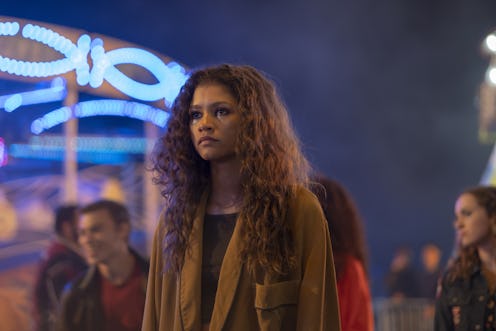Entertainment
Why The Wild 'Euphoria' Theory That Rue Is Dead Is Probably (And Hopefully) Wrong

Though HBO's Euphoria has primarily drawn in praise (and stirred up controversy) for its gritty depiction of topics like substance misuse, depression, and violence, that hasn't stopped viewers from speculating about big plot twists. In fact, one fan theory would make the show's already grim context even darker. Some people think Rue is dead, and Euphoria's story is happening in the past.
The major reasoning behind this theory stems from the way Rue omnisciently narrates each episode. She speaks of things that she should have no knowledge of: Jules' time spent in a mental hospital, Kat's past, how Nate discovered his father's extra-marital affairs. She seems to know the characters better than they know even themselves — she tells us that Nate feels uncomfortable around other naked men in locker rooms, and that Kat enjoys the validation she feels while camming.
It seems like some of what Rue tells us can be cobbled together from high school gossip. She hears from classmates that McKay tried to choke Cassie during sex, and surely Jules has told Rue about her past. But what about Nate and Kat, whose actions are being kept secret even from even their closest friends? How would Rue know any of this, the theory suggests, unless she's looking down and narrating it all from the great beyond?
It's also clear Rue is headed toward a major breaking point. Fans believe she's either going to backslide on her recovery and overdose, or that the building conflict between her, Jules, and Nate is going to boil over and result in her death in the finale. Jacob Elordi, who plays Nate, did confirm to The Hollywood Reporter that Rue and Nate have a "protagonist, antagonist kind of thing" with a "slow burning tension," so its possible fans are correct and Rue dies. But if that ends up being the case, it would feel like a disservice to the story. For one thing, Rue is a stand-in for Euphoria creator Sam Levinson, who personally struggled with drug misuse and suicidal thoughts for years.
"I spent the majority of my teenage years in hospitals, rehabs and halfway houses," Levinson told a Euphoria screening audience in June, according to Variety. "Sometime around the age of 16, I resigned myself to the idea that eventually drugs would kill me and there was no reason to fight it. I would let it take me over, and I had made peace with that."
Levinson went on to say that while in rehab he eventually overcame that mindset, and has now been sober for 14 years. But as someone who intimately knows the struggles of drug misuse, why would Levinson risk turning a story as sensitive and important as Rue's into some heavy-handed gimmick? If Rue is dead, the focus on drug misuse and its ramifications would be pushed aside in favor of rewatches looking for hints about this twist. Isn't that the opposite of what Levinson is trying to do with such an explicit, emotional portrayal?
And there are other reasons why Rue dying would be a disappointing turn. We've been shown repeatedly that she's trying to get better for Jules, her mom, and her sister Gia, even reaching out to Ali, who is also recovering from drug misuse, for extra support (and pancakes). So it would be pretty heartbreaking if she overdoses anyway. Worse, as Rue is our protagonist, if she were to die at Nate's hands it would position him as the most important character in the show, which is way more than he deserves.
Anything is possible in fiction, but ultimately, what purpose would Rue's death serve? We already understand how damaging drugs can be; we don't need to see Rue literally die to understand that. We also already know that Nate is toxically masculine and volatile; Nate killing Rue, or Nate killing Jules and then Rue killing herself, isn't going to add more depth to that other than creating heartache and frustration.
And in the end, the use of the omniscient narrator can be explained by the fact that it's a common storytelling device — it doesn't necessarily imply that the speaker is dead or god-like. It's just another way for an author to add color and information to a story. Considering we're supposed to be seeing things from Rue's perspective yet don't actually know if she's accurately showing us things, you could view Euphoria on the same fourth wall-breaking level as Deadpool or Fleabag.
Some fans even see this as exactly the point: since she's based on Levinson, Rue is like an author, reflecting on and writing Euphoria as an adult. Another popular Reddit theory is that the entire show is a story that Rue is telling Ali over a series of pancake dinners; her admissions of being an unreliable narrator are her way of telling him when she's spinning a tall tale.
Rue becoming a creator in her own right — and finding the voice she's struggled to use — would be the happiest outcome for her journey, and a final mirror of Levinson himself. While it is possible Rue is already dead, with that twist Euphoria risks landing itself beside HBO's other popular show that unfortunately put shock value above all else: Game of Thrones. Let's just hope HBO has learned from Euphoria's predecessor, and doesn't pull the rug from under fans yet again.